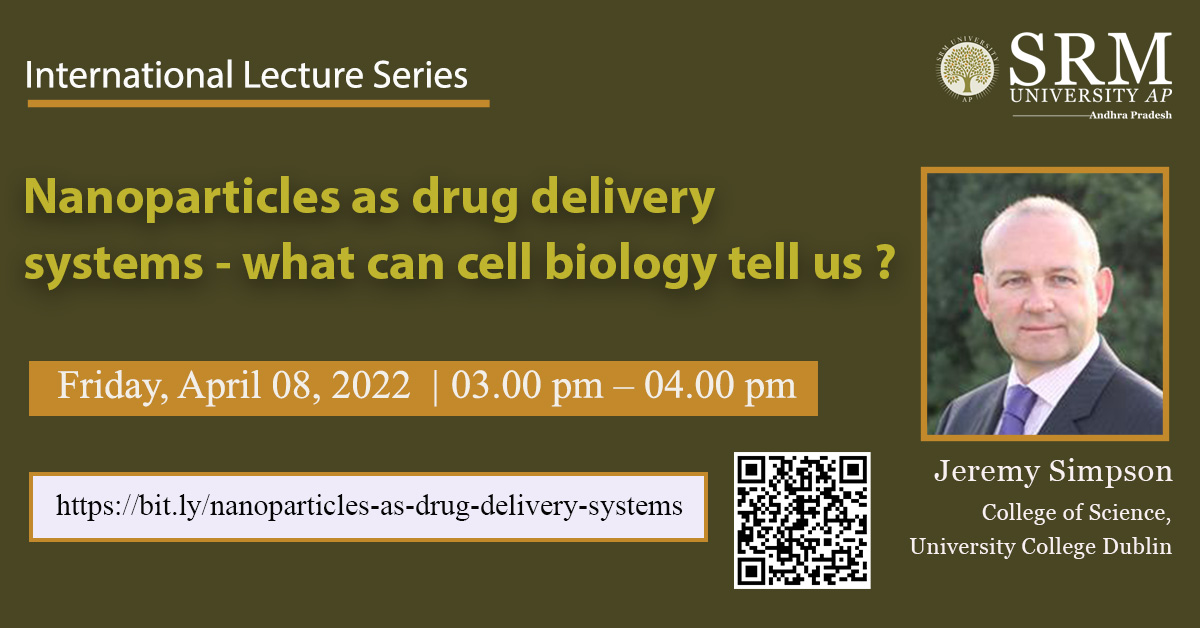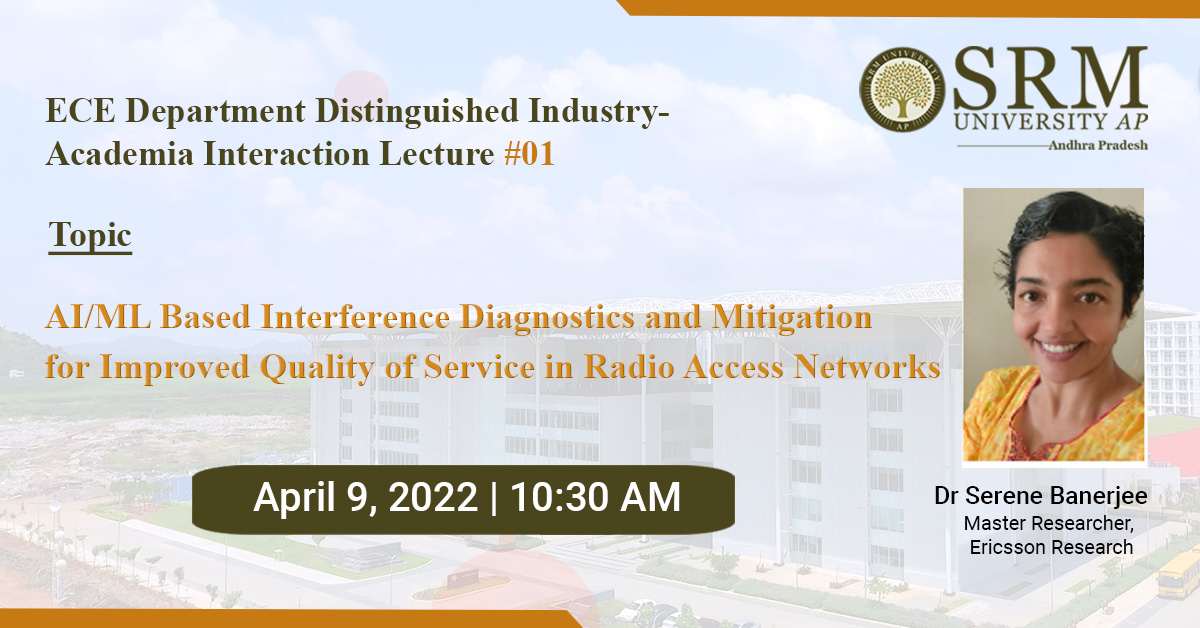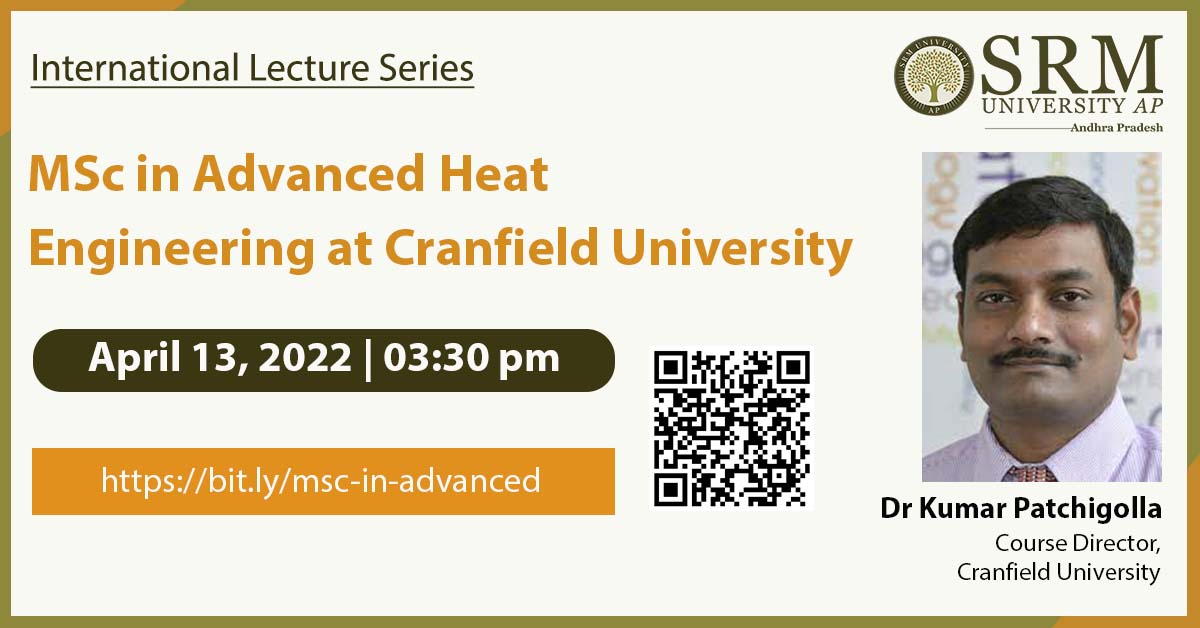Nanoparticles as drug delivery systems – what can cell biology tell us?
Guest lectures are a great opportunity for students to learn what the rest of the world thinks/researches. As a part of the International Lecture Series, The Office of International Relations and Higher Studies invites Prof Jeremy Simpson from University College, Dublin to engage the students on the topic “Nanoparticles as drug delivery systems – what can cell biology tell us?”
Nanotechnology advancements have resulted in the creation of related fields such as nanoparticle synthesis and biomedical applications. Patients and doctors alike have been given hope by nanotechnology-driven advancements in treating complicated medical problems.
Join this informative lecture on April 08, 2022, at 3.00 pm and get enlightened!
About the Speaker
Jeremy Simpson carried out his PhD work at the University of Warwick (UK), working on the trafficking of protein toxins in mammalian cells under the supervision of Profs. Mike Lord and Lynne Roberts. After post-doctoral work at the Scripps Research Institute in San Diego (USA) in the lab of Dr Bill Balch and the ICRF in London (UK) in the lab of Dr Rainer Pepperkok, he was awarded a long term EMBO fellowship allowing him to move to the European Molecular Biology Laboratory (EMBL) in Heidelberg (Germany). For over 9 years he worked at EMBL developing and applying novel high-throughput imaging approaches to study protein localisation and membrane traffic. In 2008 he was appointed as Full Professor of Cell Biology at University College Dublin, Ireland. His lab currently applies high-throughput imaging technologies to study various membrane trafficking pathways in the cell, a number of human diseases associated with defects in the endomembrane system, and the molecular basis of how synthetic nanoparticles enter cells and induce toxicity. His lab also has expertise in the growth and analysis of 3D cell models, including spheroids and organoids, and their imaging and analysis using high-content screening microscopy. His lab also develops novel software tools and approaches for image analysis. He has authored 120 peer-reviewed articles, including articles in Nature Cell Biology and Nature Methods, and a number of book chapters. He is a Fellow of the UCD Conway Institute and runs the UCD Cell Screening Laboratory (www.ucd.ie/hcs). Additional academic roles within UCD have included Head of Subject for the Cell and Molecular Biology Programme, Head of the School of Biology and Environmental Science, and Vice-Principal (International) of the UCD College of Science. In September 2021 he took up the role of College Principal and Dean of Science for the UCD College of Science.
- Published in Events, International Relations, Invited Talks, IR-Events, Webinars
AI/ML algorithms for radio access networks
The Department of Electronics and Communication Engineering is hosting the first instalment of the Distinguished Industry-Academia Interaction Lecture in the ECE DDIAL series. The event is scheduled on April 9, 2022, at 10.30 am. Dr. Serene Banerjee, Master Researcher, Ericsson Research, will be the keynote speaker. She will deliver a talk on the topic ‘AI/ML Based Interference Diagnostics and Mitigation for Improved Quality of Service in Radio Access Networks’.
Abstract of the Talk
For coverage and capacity optimization, Uplink Power Control is one of the key steps, in addition to antenna tilting and Downlink Power Control. For self-organizing networks, automated algorithms for Uplink Power Control are a necessity. However, Uplink Power Control affects the noise in the neighbouring cells. It is important to detect this interference to monitor uplink noise. Uplink noise due to power control manifests as static interference in the channel. The current state-of-the-art baseline model is based on regression models. We have proposed automated detection of static interference in the uplink channel of cells based on machine learning models. We have evaluated the same on customer data on LTE networks with high accuracy. The detected cells are subsequently used to correct the nominal power parameter through a proposed teacher-student model based on the primary cell and its neighbours. This approach shows better performance than the state-of-the-art baseline methods. The dual of static is dynamic interferences and can be attributed to traffic load, Passive Intermodulation (PIM) and thermal noise, etc. PIM identification is a major component in troubleshooting modern wireless communication systems. The introduction of carrier aggregation has increased PIM occurrences. Current state-of-the-art approaches include manual rule-based and hardware-based debugging. These approaches can detect the occurrence of PIM, long after the event occurrence and result in incurring incidental costs. We propose an ensemble of time series-based machine learning and signal processing approaches that can automatically identify PIM in real-time by analyzing Key Performance Indicators (KPI) of the primary cell and its nearest neighbours. We validate our results for various environmental conditions in data available from LTE and 5G consumer networks. We have further extended the work to multi-frequency time series to handle finer time granularities and detect PIM anomalies in an online learning setting. We further propose a self-supervised reinforcement learning approach to predict PIM related anomalies before it happens. We forecast environmental conditions that give rise to PIM based on offline historical data and model to predict future occurrences. Experimental results are on real-world datasets comprising 50,000+ cells which have shown to accurately predict PIM 60% of the time. To the best of our knowledge, this is the first work, where we are able to predict PIM anomalies before they happen. Post PIM-identification, we propose a binary search-based solution that is amenable to real-time implementation. We show through simulations that this search in tandem with a reinforcement learning-based solution can dynamically mitigate and cancel PIM. Results show that the number of steps to converge, to identify and mitigate the PIM in uplink frequency is reduced by a large factor. To summarize, our contributions include using machine learning algorithms for: (1) robust interference classification, (2) demonstrating p0-nominal recommender as teacher-student model, (3) a times-series analysis-based PIM identification, (4) extending the approach to multi-frequency time series, and for online learning, (5) demonstrating a self-supervised reinforcement learning approach to predict PIM anomalies before they happen, and (6) mitigating PIM, in spite of environmental unknowns, by employing binary search in conjunction with ML/RL-based approaches.
About the Speaker
Serene Banerjee, Master Researcher, Ericsson Research, has 17+ years of industrial experience after completing her PhD from the University of Texas at Austin, under Prof Brian L Evans in 2004. She has completed BTech(H) in Electronics and Electrical Communications Engineering from IIT Kharagpur in 1999. At Ericsson, she is focusing on developing AI/ML algorithms for Radio Access Networks. Prior to Ericsson, she has worked with Texas Instruments, HP, and Johnson Controls. She has 23 peer-reviewed publications, 9 granted patents, and several pending.
Join the webinar for an informative interaction with Dr Serene Banerjee.
- Published in Departmental Events, ECE Events, Events
MSc in Advanced Heat Engineering at Cranfield University
The heat and power industry is undergoing a major transformation, and multinational enterprises must adapt to satisfy ever-increasing present and future demands. The Office of International Relations and Higher Studies at SRM University-AP is organising a lecture titled “MSc in Advanced Heat Engineering at Cranfield University” to educate the students about the importance, scope and opportunities of the field. Dr Kumar Patchigolla, Course Director at Cranfield University will illuminate the participants on the topic on April 13, 2022, at 03.30 pm.
All are invited to participate in the lecture organised as a part of the International Lecture Series.
About the Speaker
Dr Patchigolla joined Cranfield University in 2009 as Lecturer in 2012, Senior Lecturer in 2017 and Reader in 2020. During this period he is involved in the demonstration of low-temperature heat storage (rock bed), thermal driven absorption chiller (Li-Br), combustion (fluidized, pulverized), gasification (fixed, fluidized), the capture of CO2 (Chemical/Calcium looping) and CO2 pipeline and shipping transport facilities, evaluating the effects on component durability and gas cleaning requirements of systems using a wide range of solid fuels. These include biomasses, waste and sewage sludge as well as coal either alone or in different co-fired combinations and supervision of research activities using the Pilot Scale Advanced Capture (PACT) facilities.
- Published in Events, International Relations, IR-Events, Webinars
Ushering the next era- innovation, leadership & entrepreneurship
Once upon a time “Kodak” (Kodak Croma was the leader in camera manufacturing) said – “I am the leader!!! No digitalization can impact me. I am too big and powerful for anyone and anything to be replaced!!!!…. I am invincible!”. Today “Kodak Croma” has become a fossil. The new generation is not even aware of the name.
Every innovation is the beginning of a new era. It also ushers a million changes that will have a radical impact on all aspects of life. Therefore, it is inevitable to keep abreast of all the latest happenings in the changing times as every new change opens a new world of opportunities. Unless the present generation is equipped to embrace the heralding revolution, they are locked out of infinite avenues that will lead them to a brand-new life.
The Department of Entrepreneurship and Innovation is organising an induction programme ‘Ushering the Next Era- Innovation, Leadership & Entrepreneurship’ for the students of SRM University- AP on various initiatives and activities on leadership and entrepreneurship. The programme intends to give a brief overview of the contemporary innovations in the business landscape and facilitate them to transform in tune with the recent developments. They are also given an opportunity to meet some of the budding entrepreneurs in the field to derive inspiration and orient themselves accordingly. Grab every opportunity that comes your way and transform yourselves into the leaders of tomorrow.
Date: April 8, 2022
Time: 5.00 pm IST
Venue: APJ Abdul Kalam Auditorium, X-Lab, SRMAP
You can also join us virtually for this exciting session to explore the pioneering developments in the field.
- Published in Events, IDEA Events, Webinars





